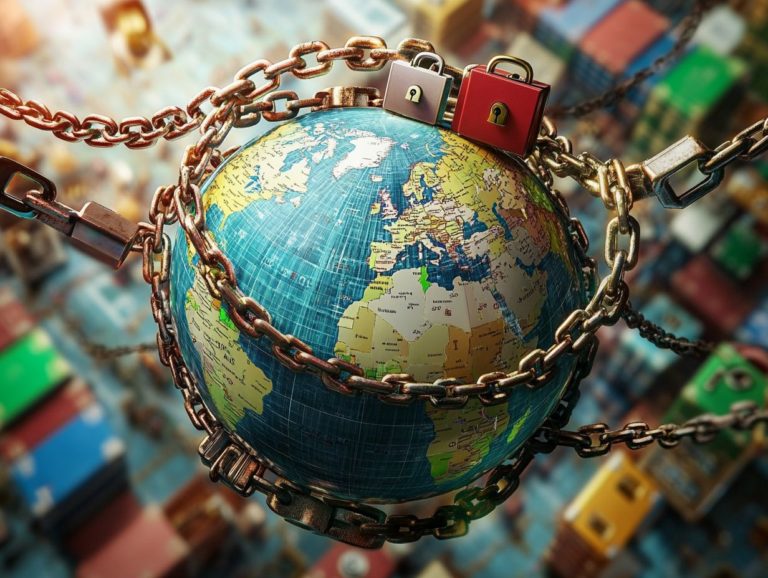How International IP Law Affects Global Trade
Intellectual Property (IP) law is pivotal in shaping global trade and business. Understanding how these laws impact innovation, competition, and market dynamics is essential for navigating today s economy.
Get ready to explore the key aspects of international IP law, highlighting the key organizations involved while examining ongoing debates and challenges in this field. We will also look into enforcement strategies and contemplate the future of IP legislation worldwide.
Prepare to uncover the intricacies and significance of international IP law in our interconnected world, providing you with the knowledge to thrive in this dynamic landscape.
Contents
- Key Takeaways:
- Understanding International IP Law
- Impact of IP Law on Global Trade
- Key Players in International IP Law
- Challenges and Controversies in International IP Law
- Enforcement of International IP Law
- Future of International IP Law
- Frequently Asked Questions
- How does International IP Law affect global trade?
- What is the role of International IP Law in global trade agreements?
- How does International IP Law promote innovation and economic growth?
- What are the potential challenges of International IP Law for developing countries?
- How does International IP Law impact the cost of goods and services in global trade?
- What are the consequences of not complying with International IP Law in global trade?
Key Takeaways:

International IP law is crucial for global trade. It protects your ideas and fosters fair practices worldwide. Key organizations like WIPO (World Intellectual Property Organization) and agreements such as TRIPS (Trade-Related Aspects of Intellectual Property Rights) play essential roles in shaping and enforcing these laws. Ongoing challenges and debates over IP rights continue to evolve as the global landscape changes.
Understanding International IP Law
Grasping the intricacies of International IP Law is essential to protect your creative rights across borders. This includes the exclusive rights to your inventions, artistic expressions, and trademarks.
A solid understanding of this legal framework nurtures innovation and aligns with your economic growth aspirations. Navigating the challenges of intellectual property law from patent protection to trademark registration is crucial.
The U.S. Patent and Trademark Office (USPTO) plays a vital role in enforcing and protecting these rights on a global stage.
Overview of Intellectual Property Rights
Intellectual property rights are legal entitlements that grant you control over your creative works. Whether it s patent protection for inventions or trademark registration for brand identifiers, these rights are essential tools for fostering innovation.
By ensuring you can reap the financial rewards of your work, these protections encourage you to invest in new ideas and technologies.
Licensing agreements allow you to permit others to use your intellectual property under specific conditions, generating revenue and expanding the reach of your creations.
Safeguarding trade secrets enhances your competitive advantage and builds consumer trust in your products. This balance between protection and access promotes a vibrant marketplace where you can thrive.
Impact of IP Law on Global Trade
The impact of IP law on global trade is profound. It creates a framework that encourages innovation while safeguarding the economic rights of creators and businesses.
Through agreements like the TRIPS Agreement under the World Trade Organization, you can see how these legal structures shape a fair marketplace.
Effects on International Business and Trade
The effects of intellectual property law on international business and trade are significant. It grants you a competitive edge by safeguarding your innovations and promoting technology transfer.
This legal framework protects your intellectual assets and instills confidence among investors and partners, encouraging collaborations that drive growth.
If you’re considering foreign markets, understanding IP regulations is crucial; violations can lead to costly disputes and damage your reputation.
Protecting trade secrets is vital to ensure your proprietary information remains confidential and secure from competitors.
Navigating patent infringement cases is also essential. These challenges can influence your strategy for market entry, affecting whether you establish local partnerships or invest in compliance measures.
The interplay of these factors significantly shapes the landscape of international trade for you.
To learn more about how IP law affects your business, explore further resources and stay informed!
Key Players in International IP Law

Key players in international IP law include influential organizations and entities that significantly shape the legal landscape.
Prominent names include the U.S. Patent and Trademark Office and the World Trade Organization, alongside dedicated intellectual property lawyers and firms that advocate for the protection of intellectual property rights globally.
Organizations and Agreements
Organizations and agreements like the World Trade Organization and the TRIPS Agreement are important in shaping international intellectual property law, ensuring that member countries comply.
These entities establish standards that member states must follow, fostering a cohesive legal environment.
Take the World Intellectual Property Organization (WIPO) as an example; it is dedicated to safeguarding intellectual property worldwide through treaties, educational programs, and dispute resolution mechanisms.
This collaboration among organizations reduces inconsistencies in national laws and encourages innovation and creativity by providing robust protections for inventors and creators.
The implications of these agreements go beyond mere compliance; they influence trade relationships and drive economic growth, while establishing vital safeguards against infringement on a global scale.
Challenges and Controversies in International IP Law
Challenges and controversies in international IP law arise from the balance between safeguarding intellectual property rights and promoting fair trade practices.
This tug-of-war often ignites debates surrounding infringement cases and public policy objectives that impact economic rights.
Debates and Disputes Surrounding IP Rights
Debates and disputes surrounding IP rights are ever-present as complexities of economic growth, consumer trust, and moral implications unfold.
Some argue that stringent regulations could lead to monopolistic practices, stifling competition. Conversely, others advocate for stronger protections, viewing them as essential for fostering innovation.
These discussions also examine how legal frameworks impact consumer choice, with critics highlighting the risk that excessive control might limit access to crucial products and ideas.
As these differing viewpoints evolve, they play a key role in shaping the legal landscape and influencing public perception, ultimately determining how intellectual property rights will evolve.
Enforcement of International IP Law
The enforcement of international IP law incorporates a range of sophisticated methods and strategies aimed at upholding intellectual property rights.
It is designed to combat infringement cases and ensure that rights holders have legal standing across diverse jurisdictions.
Methods and Strategies for Enforcement

You have various methods and strategies for enforcing intellectual property rights, including litigation, negotiation, and leveraging international legal frameworks to address patent infringement effectively.
These approaches are essential for safeguarding your interests as a creator while navigating the complexities of intellectual property law.
Litigation may be the traditional path, but it can be lengthy and costly, albeit one that might yield significant legal remedies.
Alternatively, you could consider quicker and more cost-effective solutions through mediation and arbitration, which encourage collaboration over conflict.
International treaties play an important role in harmonizing IP protection across borders, enhancing cooperation among nations and ensuring your rights are better protected globally.
Future of International IP Law
The future of international IP law is about to change dramatically! As emerging technologies, evolving public policy objectives, and the quest for economic growth converge, you will encounter new challenges and exciting opportunities in protecting intellectual property rights.
Stay informed about international IP law to protect your creativity and innovations!
Predictions and Potential Changes
Predictions regarding shifts in international IP law indicate a growing emphasis on encouraging new ideas and adapting economic rights to keep pace with rapid advancements in technology and market dynamics.
As digital transformation alters how ideas and creations are shared, it’s clear that existing frameworks may need to evolve. Stakeholders including creators, businesses, and consumers advocate for a more collaborative global approach. This approach should strike a balance between enforcing rights and ensuring broader access to knowledge and creative works.
This transition could pave the way for open innovation while simultaneously protecting against infringement. The relationship between national legislation and international agreements will be crucial in tackling the challenges posed by the internet and emerging technologies. Ultimately, this could lead to a more equitable landscape in international intellectual property law.
Frequently Asked Questions
How does International IP Law affect global trade?
International IP Law significantly impacts global trade. It sets the standards and regulations for the protection and enforcement of creations of the mind, like inventions, designs, and brands, across international borders. This affects how businesses conduct trade and compete in the global marketplace.
What is the role of International IP Law in global trade agreements?
International IP Law is integral to global trade agreements, such as the World Trade Organization’s Agreement on Trade-Related Aspects of Intellectual Property Rights (TRIPS). These agreements ensure that countries have a consistent set of rules for protecting intellectual property, promoting fair competition, and facilitating international trade.
How does International IP Law promote innovation and economic growth?
International IP Law encourages innovation and economic growth by protecting the rights of creators and innovators. By providing legal protection for their intellectual property, it incentivizes investment in research and development, ultimately leading to the creation of new products and services.
What are the potential challenges of International IP Law for developing countries?
Many developing countries struggle with challenges in complying with the standards set by International IP Law. Limited resources, technological capabilities, and lack of infrastructure can create barriers to trade and hinder economic growth in these nations.
How does International IP Law impact the cost of goods and services in global trade?
International IP Law influences how much goods and services cost in global trade. By allowing for the protection of intellectual property, it can lead to higher prices for products and services, as companies need to recoup their research and development costs and protect their rights.
What are the consequences of not complying with International IP Law in global trade?
The consequences of not complying with International IP Law in global trade can be severe. This may result in legal action, trade sanctions, and damage to a company’s reputation. Non-compliance can also lead to the loss of market share and hinder a company’s ability to compete globally.
Stay informed about changes in IP law to ensure your business thrives globally!







